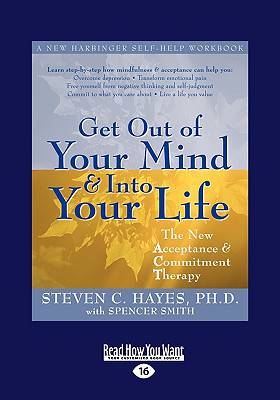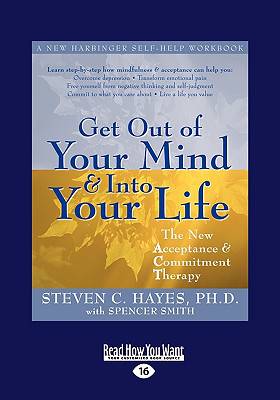
- Retrait gratuit dans votre magasin Club
- 7.000.000 titres dans notre catalogue
- Payer en toute sécurité
- Toujours un magasin près de chez vous
- Retrait gratuit dans votre magasin Club
- 7.000.0000 titres dans notre catalogue
- Payer en toute sécurité
- Toujours un magasin près de chez vous
Get Out of Your Mind and Into Your Life (Easyread Large Edition)
Steven Hayes, Spencer Smith
Livre broché | Anglais
56,95 €
+ 113 points
Description
For a scientist committed to empirical evaluation, it is important to show that materials can be helpful outside the context of a therapeutic relationship, so, generally speaking, we know that a book like this is likely to be helpful. Several of the specific components in this book have been tested, sometimes in a form very similar to the way you are contacting this material. For example, several studies evaluated the impact of short passages drawn nearly word for word from ACT materials (very similar to what you've read) that were recorded on audiotape, read aloud by a research assistant, or were presented to the participants to read. Typically, these studies focused on the ability of participants to tolerate distress of various kinds, such as gas-induced panic-like symptoms, extreme cold, extreme heat, or electric shock. A few studies looked at the distress produced by difficult or intrusive cognitions, or clinically relevant anxiety. Some were done with patients, others with normal populations. The specific ACT components that have been examined so far include defusion, acceptance, mind-fulness, and values. The techniques included exercises, metaphors, and rationales, including several that can be found in this book (e.g., word repetition, physicalizing, leaves on a stream, the quicksand metaphor, the Chinese finger trap metaphor, and so forth). Thus, it seems fair to say that it is known that at least some of what you've read can be helpful at least some of the time outside of the context of a therapeutic relationship, when presented in a form similar to the form in which you have contacted this material.....Steven C. Hayes, Ph.D., is University of Nevada Foundation Professor of Psychology at the University of Nevada, Reno. He is author of more than 350 scientific articles and twenty-seven books, including Acceptance and Commitment Therapy and Relational Frame Theory - two books that significantly develop the concepts on which Get Out of Your Mind and Into Your Life is based. His research explores the nature of human language and cognition and their application to the understanding and alleviation of human suffering. In 1992, the Institute for Scientific Information reported Hayes among the highest-impact psychologists in the world during the years 1986-90 based on the citation impact of his writings. He is past-president of the Association for Advancement of Behavior Therapy, the American Association of Applied and Preventive Psychology, and Division Twenty-Five of the American Psychological Association. He was the first Secretary-Treasurer of the American Psychological Society. He is the recipient of the Don F. Hake Award for Exemplary Contributions to Basic Behavioral Research and Its Applications from Division 25 of the American Psychological Association. In 1999, US Health and Human Services Secretary Donna Shalala appointed him to a four-year term on the National Advisory Council on Drug Abuse. Spencer Smith is a writer and editor based in Santa Rosa, CA. He is coauthor of The Memory Doctor.
Spécifications
Parties prenantes
- Auteur(s) :
- Editeur:
Contenu
- Nombre de pages :
- 518
- Langue:
- Anglais
Caractéristiques
- EAN:
- 9781458717108
- Date de parution :
- 04-09-09
- Format:
- Livre broché
- Format numérique:
- Trade paperback (VS)
- Dimensions :
- 178 mm x 254 mm
- Poids :
- 889 g

Les avis
Nous publions uniquement les avis qui respectent les conditions requises. Consultez nos conditions pour les avis.






